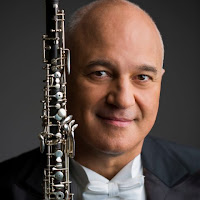Distinguished oboist raises profile of modern works with piano in 'When There Are No Words...'
The subtitle "Revolutionary Works for Oboe and Piano" could be slightly misleading, but it's in the good cause of showing how different composers respond to threats at the micro and macro levels.
"When There Are No Words..." (Cedille Records) gathers 20th-century pieces that deserve a hearing not because they are in themselves revolutionary, but because they seem to upset any pristine apple carts that purport to advance music in some kind of pure, self-referential condition.
 | |
| Alex Klein works well with pianist Phillip Bush. | |
Alex Klein, principal oboist emeritus with the Chicago Symphony Orchestra and now holding down the first chair in the oboe section of the Calgary Philharmonic, teams once again with pianist Phillip Bush to put across a program of music by Paul Hindemith, William Bolcom, Pavel Haas, Benjamin Britten, Jose Siqueira, and Klement Slavicky.
In addition to the wide spectrum their styles cover, the six composers faced challenges from the world outside music either insofar as their attitudes toward disturbing events shaped their creative activity or their lives were altered, damaged or even destroyed by direct threats.
Hindemith's Sonata for Oboe and Piano leads the program off. The German composer's sturdy, personal manner of neo-classicism is demonstrated in two movements, the first functioning as a kind of prelude to the expansive "Sehr langsam," which is only "very slow" in parts. It mounts to a majestic conclusion that can be interpreted as defiance of the Nazi regime that forced Hindemith's exile and his eventual resettlement in the United States.
Pavel Haas' Suite for Oboe and Piano, by a victim of the Holocaust, brings out especially well the vivid interpretive personality of this duo. The "Con fuoco" middle movement is intense and contrasts the two instruments agreeably. Bush, a 1983 fellowship winner for what became the American Pianists Association, is especially impressive in putting across this music.
Bolcom's "Aubade" sums up in six minutes a pensive salute to daybreak in a time of anxiety (1980) in which the anxiety is both represented and kept at bay. The writing for oboe seems punishing in its demands, which Klein surmounts readily against an accompaniment of chords and arpeggios from the piano.
Benjamin Britten's pacifism was continually at odds with the warlike world he lived in. "Temporal Variations" covers his ready response to musical forms and styles that his extensive gifts allowed him to address in brief form. His "March" here is as sardonic as his friend Dmitri Shostakovich often was when his muse turned martial. There are nine delicious bagatelles in this set. The duo is adept at catching each mood in its cameo form.
Jose Siqueira's loyalty to his Brazilian homeland was tested by political turmoil in the 1980s, and his life ended in exile soon afterward. Three Etudes is a buoyant expression of an imaginative world free of oppression, with a playful cast overall. The piano writing has a bell-like clarity and verve.
Slavicky's resistance to communism in his Czech homeland ended his career. His music in the Suite for Oboe and Piano recorded here is free of constraints, other than the dirge-like overcast of the "Triste"movement. Otherwise, the message is resilience, nowhere more triumphant than in the finale, "Bacchanale rustico." It springs free of all constraints, and the virtuosity of pianist and oboist couldn't come across any more splendid than it does in concluding this cherishable program.



Comments
Post a Comment